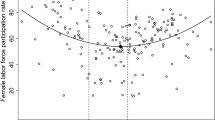Abstract
Poverty trends in Ghana show a decline over the last two decades. However, the period also shows evidence of the intensification of vulnerability and exclusion among some groups, including women. Among several variables accounting for women’s vulnerability to poverty are gender inequalities, which it is argued, undermines development and the prospects for improving standards of living. Therefore it has been suggested that policies, which aim at reducing poverty and promoting sustainable development must integrate gender equality, equity and women’s empowerment in its goals. Despite these, the interconnections between a reduction in gender inequality and a reduction in poverty are complex. The paper explores the gender dimensions of poverty in Ghana, and how gender inequalities are manifested and implicated in the reproduction of poverty. It also assesses the extent to which these have been taken into account in poverty reduction strategies and policies to enhance the situation of women. It concludes that if strategies to engender poverty reduction programmes are to be sustainable it is important to recognize unequal gender relations and the structures of power that women confront at all levels in Ghana and how these increase women’s vulnerability to poverty.



Similar content being viewed by others
References
Awumbila, M. (1997). Gender and structural adjustment in Ghana: A case study in northeast Ghana. In A. Awotona, & N. Teymur (Eds.), Tradition, location and community: Place-making and development (pp. 161–172). Aldershot: Avebury.
Awumbila, M. (2001). Women and gender equality in Ghana: A situational analysis. In E. Tsikata (Ed.), Gender training in Ghana: Trends in politics, issues and tools (pp. 33–59). Accra: Woeli.
Awumbila, M. (2006). The gendered face of poverty: Female porters adaptive responses to poverty in urban Ghana. Paper presented at the 49th African Studies Association Annual Meeting, San Francisco, 16–19 November 2006.
Awumbila, M., & Momsen, J. H. (1995). Gender and the environment: Women’s time use as a measure of environmental change. Global Environmental Change, 5(5), 337–346.
Baden, S., & Milward, K. (1995). Gender and poverty. BRIDGE Report No 30. Brighton: Institute of Development Studies.
Benneh, G., Kasanga, R. K., & Amoyaw, D. (1995). Women’s access to agricultural land in the household: A case study of three selected districts in Ghana. Accra: FADEP.
Buvinic, M. (1997). Women in poverty: A new global underclass. Foreign Policy, Fall, 38–53.
Duncan, B. (1997). Women in agriculture in Ghana. Accra: FES/FIDA.
Ghana Health Service (2003). HIV sentinel survey 2002 report. Accra: Ghana Health Service.
Ghana Statistical Service (1995). Ghana living standards survey 3 (1992/1992). Accra: Ghana Statistical Service.
Ghana Statistical Service (2000). Ghana living standards survey 4 (1998). Accra: Ghana Statistical Service.
Ghana Statistical Service (2005a). Ghana 2003 core welfare indicators questionnaire (CWIQ II) survey report. Accra: Ghana Statistical Service.
Ghana Statistical Service (2005b). Ghana: Population data analysis report: Vol 1. Socio-economic and demographic trends, Accra. Accra: Ghana Statistical Service.
Government of Ghana (2003). Ghana poverty reduction strategy, an agenda for growth and prosperity, vol. 1. Accra: National Development Planning Commission.
Gladwin, C. (Ed.) (1991). Structural adjustment and African women framers. Gainesville: University of Florida Press.
Heintz, J. (2005). Employment, poverty and gender in Ghana. Working paper Series Number 92, Political Economy Research Institute. Amherst: University of Massachusetts.
Jackson, C., & Palmer-Jones, R. (2000). Rethinking gendered poverty and work. In S. Razavi (Ed.), Gendered poverty and well-being (pp. 145–170). Oxford: Blackwell.
Kabeer, N. (1994). Reversed realities: Gender hierarchies in development thought. London: Verso.
Kabeer, N. (1997). Tactics and trade-offs: Revisiting the link between gender and poverty. Institute of Development Studies Bulletin, 28(3), 1–13. Brighton: University of Sussex.
Kotey, A. N., & Tsikata, D. (1998). Gender relations and land in Ghana. In A. Kuenyehia (Ed.), Women and law in West Africa: Situational analysis of some key issues affecting women. Accra: WALWA.
Lloyd, C., & Gage-Brandon, A. (1993). Women’s role in maintaining households: Family welfare and sexual inequality in Ghana. Population Studies, 47(1), 115–131.
Manuh, T., Songsore, J., & Mackenzie, F. (1997). Gender and land: The interface between legislative initiatives, customary tenure and land use management in Ghana. Canada: Research Report Submitted to IDRC.
Norton, A., Bortei-Doku Aryeetey, H., Korboe, D., & Dogbe, D. K. (1995). Poverty assessment in Ghana using qualitative and participatory research methods. PSP Discussion Paper Series, No. 83, Poverty and Social Policy Department. Washington D.C.: The World Bank.
Razavi, S. (Ed.) (2000). Gendered poverty and well-being. Oxford: Blackwell.
Songsore, J. (2003). Regional development in Ghana. The theory and the reality. Accra: Woeli Publishing Services.
Tsikata, D. (1995). Effects of structural adjustment on women and the poor. Accra: Third World Network.
Whitehead, A. (2004). Persistent poverty in upper East Ghana––Basis Brief. Collaborative Research Support Programme. No. 26, November 2004.
Whitehead, A., & Lockwood, M. (2000). Gendering poverty: A review of six world bank African poverty assessments. In S. Razavi (Ed.), Gendered poverty and well-being (pp. 115–144). Oxford: Blackwell.
World Bank (2001a). African poverty at the millennium: Causes, complexities and challenges. Washington DC: The World Bank.
World Bank (2001b). Engendering development through gender equality in rights, resources and voice. Washington DC: World Bank Policy Research Report, World Bank and Oxford University Press.
World Bank (2003). Gender equality and the millennium development goals. Washington DC: The World Bank Gender and Development Group.
Author information
Authors and Affiliations
Corresponding author
Rights and permissions
About this article
Cite this article
Awumbila, M. Gender equality and poverty in Ghana: implications for poverty reduction strategies. GeoJournal 67, 149–161 (2006). https://doi.org/10.1007/s10708-007-9042-7
Received:
Accepted:
Published:
Issue Date:
DOI: https://doi.org/10.1007/s10708-007-9042-7



